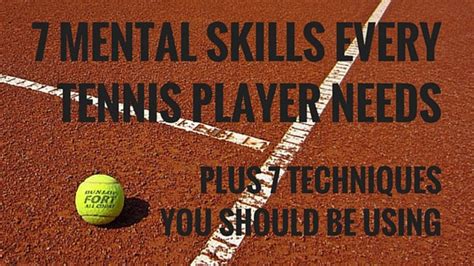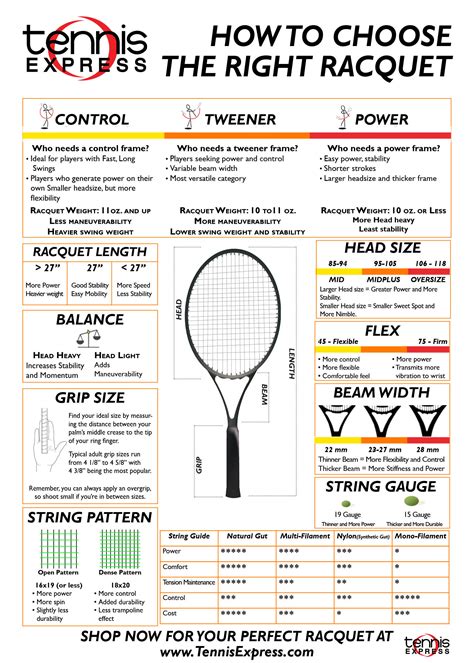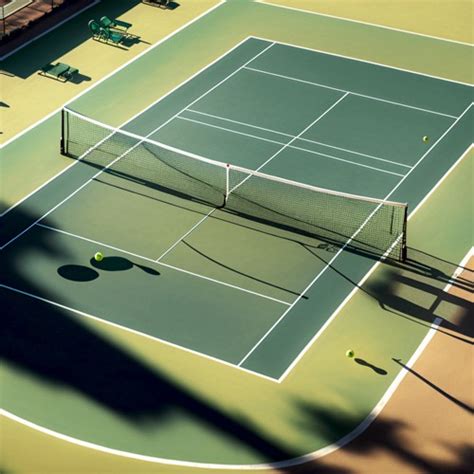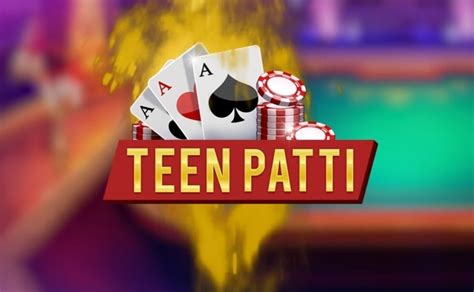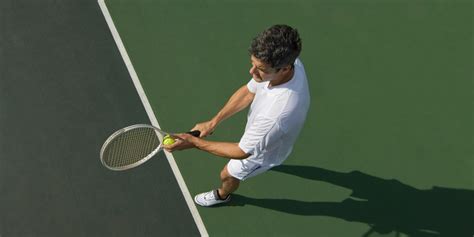Explore essential mental skills for tennis success, including visualization, focus, resilience, and mindfulness techniques to enhance your performance on the court.In the world of tennis, physical prowess and technical skills are undoubtedly vital, but what often separates the champions from the rest is their mental fortitude. The journey to becoming a successful player requires more than just mastering forehands and serves; it calls for cultivating essential mental skills that can turn potential into performance. This article delves into crucial aspects such as visualization techniques, focus, concentration, and resilience, equipping you with strategies to sharpen your mental game. We’ll also explore how mindfulness practices can bring clarity and composure to your performance on the court. Whether you’re a competitive athlete or a weekend warrior, understanding and applying these mental skills can elevate your game, leading to improved results and deeper enjoyment of the sport. Join us as we unlock the mental keys to tennis success!
Understanding The Importance Of Essential Mental Skills In Tennis
In the high-pressure environment of tennis, skills beyond physical prowess are crucial for success. Essential mental skills play a pivotal role in how players perform under pressure, strategize during matches, and cope with the emotional highs and lows of competition. Unlike other sports, tennis demands not only individual expertise but also mental fortitude, making these skills indispensable.
Here are some key reasons why developing essential mental skills is vital for tennis players:
| Mental Skill | Importance |
|---|---|
| Focus | Maintains concentration on the game, reducing distractions. |
| Resilience | Enables recovery from setbacks and maintaining a positive mindset. |
| Visualization | Helps in mentally rehearsing scenarios, improving confidence and execution. |
| Mindfulness | Promotes awareness and presence during matches, enhancing performance. |
To excel in tennis, players must acknowledge that their mental game is as important as their physical training. Investing time and effort into honing these essential mental skills can lead to improved performance, greater consistency, and increased enjoyment of the sport. Thus, a balanced approach that includes both physical and mental preparation is crucial for any serious tennis player. By prioritizing the development of these crucial skills, an athlete can gain a competitive edge and navigate the challenges of the game more effectively.
How Visualization Techniques Enhance Performance In Tennis
Visualization techniques are a crucial element of the Essential Mental skills that every tennis player should incorporate into their training regimen. By mentally rehearsing specific skills and match situations, players can enhance their performance and boost their confidence on the court.
Visualization involves creating a mental image of successful plays, which not only helps in skill development but also in preparing for high-pressure situations. This technique allows players to imagine executing their serve, returning difficult shots, or navigating challenging match scenarios, thus conditioning their minds to react positively during actual gameplay.
Research has shown that athletes who employ visualization techniques often experience improved focus and reduced anxiety levels. When a player visualizes their performance, they activate the same neural pathways that occur during physical practice, helping to reinforce muscle memory and improve overall execution of skills.
Furthermore, visualization can be particularly effective when paired with other Essential Mental skills, such as mindfulness and resilience. By integrating these techniques, players can create a comprehensive mental training plan that not only prepares them for success in matches but also helps them bounce back from setbacks and maintain a competitive edge.
Utilizing visualization techniques as part of the Essential Mental skills arsenal can significantly enhance a tennis player’s performance, enabling them to approach each match with greater confidence and assurance in their abilities.
Developing Focus And Concentration For Better Match Play
In the fast-paced world of tennis, developing focus and concentration is critical for performing at your best. Essential mental skills allow players to block out distractions, stay present during points, and maintain a high level of mental energy throughout the match. Here are key strategies to enhance your focus and concentration on the court:
- Setting Clear Goals: Before entering a match, establish specific, achievable goals. This could range from focusing on your serve to maintaining your energy levels. Having clear objectives helps you stay engaged in the match.
- Routine Development: Create a pre-serve and pre-return routine that helps you calm your mind and prepare for the next point. Consistency in rituals can anchor your focus, signaling your brain to enter a competitive mindset.
- Breathing Techniques: Use deep breathing exercises to maintain a composed state. Focusing on your breath during pivotal moments can help you regain concentration and reduce anxiety.
- Positive Self-Talk: Positive affirmations can help reinforce focus during challenging situations. By replacing negative thoughts with constructive phrases, you build mental resilience and maintain attention on your game instead of external pressures.
- Mindfulness Practices: Incorporating mindfulness into your training can significantly improve your focus. Practicing being present in each moment, whether through meditation or mindful observation, helps you to remain less reactive during matches.
- Limiting Distractions: Identify what distracts you both on and off the court, and take steps to minimize these interruptions. Whether it’s noise from the crowd or thoughts about the future, reducing external and internal distractions can enhance performance.
By integrating these strategies into your training and match play, you can cultivate the focus and concentration necessary to excel in tennis. Mastering these essential mental skills will not only improve your game but also enhance your overall enjoyment of the sport.
Building Resilience: Essential Mental Skills For Tennis Success
In the high-pressure environment of competitive tennis, players must cultivate the ability to bounce back from setbacks and maintain their composure during challenging times. Building resilience is one of the most critical essential mental skills for tennis success. It enables players to overcome difficulties, stay focused on their goals, and continue improving their performance despite obstacles.
Resilience in tennis involves several key components:
- Emotional Regulation: The ability to manage emotions effectively during a match can significantly impact performance. Players should develop techniques to control their frustration, anxiety, and excitement. Techniques such as deep breathing and self-talk may aid in maintaining emotional balance.
- Positive Mindset: A resilient player possesses a positive outlook, reframing challenges as opportunities for growth. Emphasizing progress rather than perfection helps to create a healthy competitive spirit, which is essential for long-term success.
- Goal Setting: Establishing achievable goals allows players to focus on the process rather than solely the outcome. This encourages a sense of purpose and motivation, which are pivotal for cultivating resilience.
- Learning from Failure: Instead of viewing losses as defeats, resilient players see them as learning experiences. Analyzing what went wrong and celebrating small victories can foster a growth mindset and improve future performances.
- Support Systems: Building relationships with coaches and fellow players provides a source of encouragement and motivation during tough times. A strong support network can help players navigate challenges with strength and determination.
Developing resilience as one of the essential mental skills for tennis players is vital for achieving long-term success. By focusing on emotional regulation, maintaining a positive mindset, setting realistic goals, learning from setbacks, and utilizing support systems, players can enhance their ability to perform under pressure and ultimately achieve their tennis aspirations.
Applying Mindfulness To Improve Your Tennis Game
Mindfulness is a powerful tool for tennis players looking to enhance their game. By being present and fully engaged in each moment on the court, athletes can significantly improve their performance. Here are several techniques and benefits of incorporating mindfulness into your tennis practice:
- Enhanced Awareness: Mindfulness encourages players to focus on their thoughts, feelings, and bodily sensations during play. This heightened awareness can help identify areas for improvement and allow for quicker adjustments during matches.
- Emotional Regulation: Mindfulness training can help players manage anxiety and stress, both of which can be detrimental to performance. By practicing mindfulness, players can learn to stay calm under pressure and maintain a positive mindset.
- Improved Concentration: Mindfulness improves your ability to concentrate on the task at hand. This is crucial in tennis, where distractions can arise from external factors or internal thoughts.
- Better Decision Making: A clear mind allows for improved decision-making on the court. By being present, players can evaluate their surroundings and make choices more effectively.
Integrating mindfulness into training can be as simple as incorporating breathing exercises before matches, practicing meditation techniques, or participating in guided visualizations that promote focus and relaxation. The goal is to create a mental environment where you are less hindered by distractions and better able to utilize those essential mental skills that can lead to tennis success.
| Mindfulness Technique | Benefits |
|---|---|
| Breathing Exercises | Reduces anxiety and increases focus |
| Meditation | Enhances overall mental clarity and calmness |
| Body Scanning | Improves physical awareness and tension release |
By consistently practicing these mindfulness techniques, tennis players can cultivate a more resilient and strategic approach to their game, ultimately leading to greater enjoyment and success on the court.
Frequently Asked Questions
What are essential mental skills for tennis players?
Essential mental skills for tennis players include focus, confidence, resilience, visualization, emotional control, and self-talk.
How does focus impact a tennis player’s performance?
Focus allows tennis players to concentrate on the present moment, improving their ability to make quick decisions and respond effectively during matches.
Why is resilience important in tennis?
Resilience helps players bounce back from losses and setbacks, enabling them to maintain a positive mindset and continue striving for improvement.
What role does visualization play in a tennis player’s training?
Visualization aids in mental rehearsal, allowing players to picture themselves executing strategies and techniques effectively, which can enhance their performance during actual games.
How can emotional control benefit tennis players?
Emotional control helps players manage stress and anxiety, enabling them to maintain composure and make rational decisions rather than reacting impulsively.
What is self-talk, and how can it influence performance?
Self-talk refers to the internal dialogue players have with themselves. Positive self-talk can boost confidence and motivation, while negative self-talk can undermine performance.
Can mental skills be developed over time?
Yes, mental skills can be developed through practice, training, and incorporation of techniques such as mindfulness, goal setting, and mental imagery.

